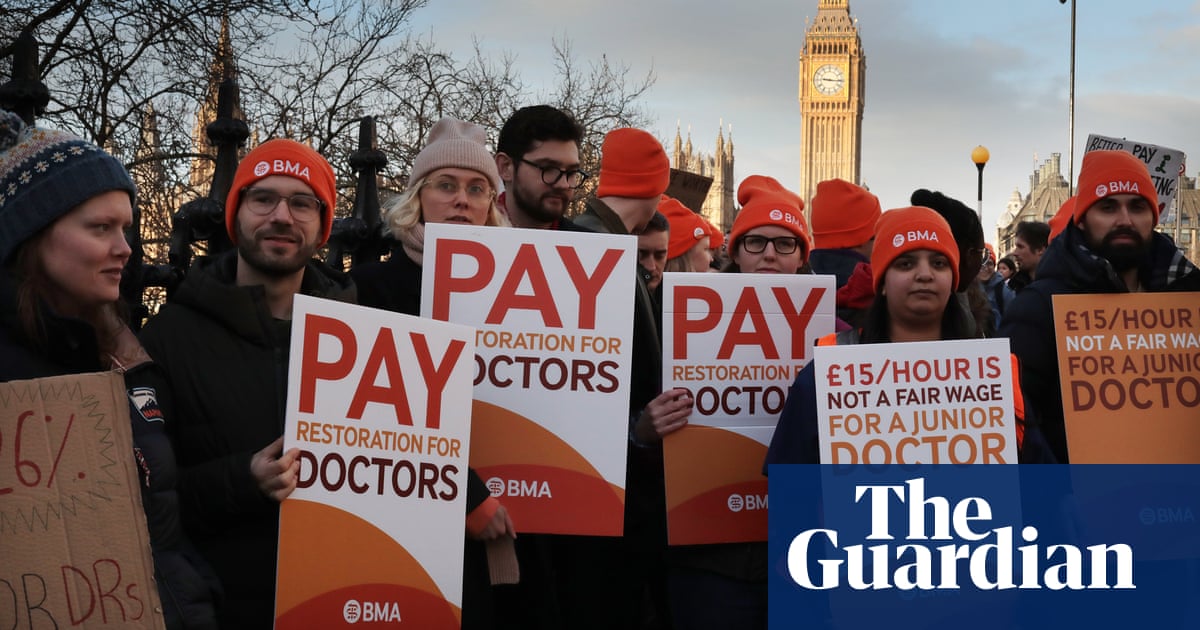Junior doctors to go on strike in England in week before general election | Doctors

Junior doctors in England are to strike for five days in their long-running pay dispute, bringing a fresh wave of disruption to the NHS in the week leading up to the general election.
Thousands of patients face having their care cancelled after the British Medical Association announced a strike from 7am on 27 June until 7am on 2 July. Voters go to the polls on 4 July.
The development will add to the pressure on Rishi Sunak, who has been accused of holding up a deal over pay, to urgently resolve the row.
In a statement on Wednesday, the BMA junior doctors committee co-chairs, Dr Robert Laurenson and Dr Vivek Trivedi, said: “We made clear to the government that we would strike unless discussions ended in a credible pay offer. For more than 18 months we have been asking Rishi Sunak to put forward proposals to restore the pay junior doctors have lost over the past 15 years – equal to more than a quarter in real terms.”
They said that when they entered mediation with the government this month they did so under the impression that “we had a functioning government that would soon be making an offer. Clearly no offer is now forthcoming. Junior doctors are fed up and out of patience.”
Sunak still had an opportunity to show that he cared about the NHS and its workers, Laurenson and Trivedi added. “If during this campaign he makes such a public commitment that is acceptable to the BMA’s junior doctors committee, then no strikes need go ahead.”
Health leaders expressed alarm, warning the five-day strike would again jeopardise efforts to tackle the record waiting list and push other services to breaking point.
Junior doctors in England voted in March to keep on striking until the middle of September. Those belonging to the BMA voted overwhelmingly to stage further stoppages in addition to the 41 days of strikes held since March 2023.
They backed a further six months of stoppages by 98% on a 62% turnout. There was almost unanimous support – 97% in favour, with just 3% against – for taking action short of a strike, such as refusing to work overtime, in pursuit of a 35% pay rise.
They are seeking the 35% rise as “full restoration” of the 26% drop in the real-terms value of their salaries since 2008.
The health secretary challenged Labour to condemn the junior doctors’ decision to strike during the election campaign. Writing on X, Victoria Atkins said: “Today should be the day the Labour party finally condemn junior doctor strikes. Announcing this during an election and on Labour’s health day shows this was only ever political and not about patients or staff.”
after newsletter promotion
She described it as a “highly cynical tactic”, adding: “This Conservative government has taken the tough decisions to keep public spending down to bear down on inflation, which is now back to normal. Labour would be in the hands of their union paymasters – meaning more spending and higher taxes.”
The Labour leader, Keir Starmer, vowed to “get in the room” with junior doctors to settle the pay dispute, though he said a Labour government would not be able to award them a full pay rise.
Starmer said: “If we do get over the line and come into serve, it will fall to us to resolve this issue. That will only happen if we get in the room and have a discussion with the doctors about the issues that are at stake.
“We’ve had to make clear already that we can’t afford to meet the 35% that they are putting on the table. But there are other issues in relation to pay. What you won’t get is a government that is simply sitting it out and having an argument about who gets in the room first to start and have the negotiations, because we have to resolve this.”
Source link




